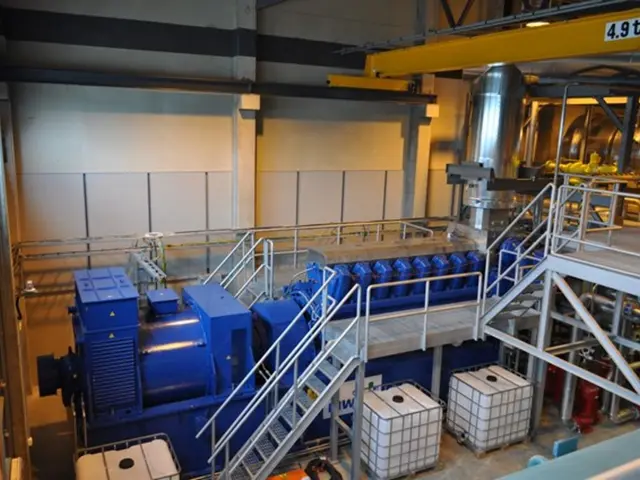Stock market escalates, mirroring increased corporate earnings, amid doubt about Trump's trade conflict escalation.
Rewritten Article:
Soaring high again! U.S. stocks surged on Tuesday, extending their impressive winning streak to six days. The S&P 500 climbed 0.6%, the Dow Jones industrials added 300 points, and the Nasdaq increased by 0.5%, all driven by stronger-than-projected corporate earnings. But CEOs are anxious about the long-term effects of President Trump's trade war.
Honeywell International led the pack, soaring 5.4% following its report of better-than-expected earnings and revised full-year profit forecasts. Executive Officer Vimal Kapur acknowledged the looming uncertainty surrounding President Trump's trade war, stating, "We recognize we face an uncertain global demand environment for the remainder of 2025...".
Sherwin-Williams approached the market with a 4.8% gain, mirroring Honeywell's success after also announcing stronger-than-expected earnings. However, CEO Heidi Petz expressed concerns about ongoing softness from some customers, anticipating it to persist well into the second half of this year.
Not all stocks were as fortunate despite beating earnings expectations. UPS took a hit, dropping 0.4% after delaying its financial forecasts for 2025 due to the dreaded "current macro-economic uncertainty." CEO Carol Tome presented a gloomy outlook, stating, "We're not updating our financial forecasts previously given for 2025..."
The ongoing trade war continues to cast a dark shadow over business confidence, raising fears of a potential recession. Tariffs could freeze global trade, escalate prices for various products, and throw long-term business and household plans into disarray. U.S. households are growing increasingly pessimistic due to the tariffs, with expectations for income, business, and job market conditions plummeting to levels last seen in 2011, pointing towards a possible future recession.
Trade uncertainty, however, may serve a strategic purpose, as U.S. Treasury Secretary Scott Bessent admitted, stating, "President Trump creates what I would call strategic uncertainty in the negotiations..."
Trade war effects extend beyond the U.S., impacting business confidence, financial forecasts, and strategic adjustments. The trade tensions disrupt supply chains, increase operational risks, and affect a variety of industries, from clean energy to manufacturing. To navigate this challenging landscape, CEOs must remain resilient, adaptable, and forward-looking, diversifying supply chains, exploring alternative markets, and investing in local production capacities.
As the trade war rages on, stock market roller-coasters are becoming an everyday occurrence, yet business confidence and forecasts continue to waver. In this age of uncertainty, it is crucial for companies to be flexible, Resourceful, and willing to embrace a novel approach to chart a sustainable path forward.
Choe writes for the Associated Press
More to Read
- Largest Tech Players Fuel Wall Street's Triumphant Close of a Tumultuous Week
- U.S. Stocks Regain Ground as Companies' Profits Spur a Third Day of Gains, for Now At Least
- Trump's Fluctuating Trade Policies and Fed Chair Bring Another Round of Stock Market Gains
1.CEOs from various industries, including the tech sector, are facing an uncertain global demand environment due to President Trump's trade war, as stated by the Largest Tech Players.
- The ongoing trade war and fluctuating trade policies are fueling a volatile stock market, as suggested by the title of the article, "Trump's Fluctuating Trade Policies and Fed Chair Bring Another Round of Stock Market Gains."
- Businesses and households alike are growing increasingly pessimistic due to the trade tensions and tariffs, with expectations for income, business, and job market conditions dwindling, as reported by Choe for the Associated Press.
- Even amidst trade uncertainty, the stock market has seen recent gains, with companies' profits spurring a third day of gains, according to an article titled, "U.S. Stocks Regain Ground as Companies' Profits Spur a Third Day of Gains, for Now At Least."
- In the fast-changing landscape of the stock market, personal-finance experts advise stockholders to remain resilient and adaptable, ready to make strategic adjustments and diversify investments.
- Gloomy financial forecasts are becoming more common due to the ongoing trade tensions, as demonstrated by UPS' delay in updating its 2025 financial forecasts, which Choe for the Associated Press reported.
- Beyond the US, the trade tensions are disrupting supply chains and increasing operational risks for a variety of industries, from clean energy to manufacturing, as suggested by the title, "Trade war effects extend beyond the U.S...."
- Contending with the unpredictable nature of the trade war, CEOs should focus on diversifying supply chains, exploring alternative markets, and investing in local production capacities, as a means to stay afloat and prosper, as discussed in the article.
- Despite the stock market rollercoaster, individual investors are urged to view this as an opportunity to invest wisely and build a sustainable personal-finance portfolio, given that uncertainties in the general-news landscape are likely to persist in the years leading to 2025.








